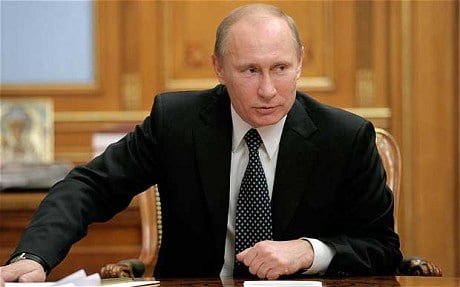
Published 13-12-2012, 14:09
 Russian President Vladimir Putin gave his annual state-of-the-nation speech to the assembled elite on December 12, but the meeting smacked more of the oligarch meeting of February 2000 than a regular political set piece.
Russian President Vladimir Putin gave his annual state-of-the-nation speech to the assembled elite on December 12, but the meeting smacked more of the oligarch meeting of February 2000 than a regular political set piece.I am talking about Putin's comments on corruption rather than the rest of the speech, which was an outline of reform plans and policy. Putin told deputies from both the lower and upper houses that he was going to get serious on things like banning the ownership of foreign houses or hiding cash in offshore accounts: "Don't clap. I don't think you are going to like it," he said. They clapped anyway. What else could they do?
If you remember, one of the first things Putin did on taking office for the first time was call all the top oligarchs in for a roundtable discussion in 2000. It was an historic meeting that set the tone for the succeeding 12 years.
The oligarchs had grabbed control of most of Russia's most valuable assets in the so-called "loans-for-shares" scheme in 1995-1996 and were more or less running the country after the former president Boris Yeltsin suffered a stroke and quadruple heart bypass operation in short succession.
However, what made the meeting so dramatic was in the months prior Putin had arrested Vladimir Gusinsky, the founder and owner of NTV, which was at the time Russia's leading commercial TV station and openly political. He had also driven Boris Berezovsky into self-imposed political exile, who controlled among other things ORT (now called the First Channel), Russia's main state owned TV station. "It was clear to everyone what the deal was," Stephen Jennings, the founder of Renaissance Capital, told me at the time. "Putin arrived and dumped two bodies on the table in front of the most powerful men in Russia – those of Gusinsky and Berezovsky. Then he offered a deal."
And that deal was pretty simple: "Keep what you have, but stop the stealing."
Of course, things didn't go entirely to plan, as the stealing has continued and Putin clashed with Yukos owner Mikhail Khodorkovsky, who was arrested in 2003. But after that, the oligarchs have become increasingly well behaved, even if few of them are respectable enough to have tea with the Queen.
So has a similar thing just happened with this year's state-of-the-nation speech?
Again, Putin has just taken up the post of president. Again, he is setting the tone for the next six (and possibly 12) years. Again, he has come to a meeting with the most powerful men in the country. And again, he has thrown a few bodies on the table, following a string of very high profile corruption investigations in November that included the sacking of the Russian defence minister Anatoly Serdyukov.
Putin has been clear that he is not starting a witch-hunt with the recent corruption campaign. He said earlier in December: "This is not a campaign, but our policy of fighting corruption," adding that there will be arrests, but that harsh punishment was not the point. "The issue is not one of how tough the punishment is. The issue is its inevitability," he said.
But in this speech he was a lot more specific about exactly what is expected from the top men in the administration – and specifically pointed out that the orders to refrain from graft or hording applied to "Duma deputies and members of the Federation council."
He called on the government to support restrictions on property, securities, and bank accounts of politicians and officials registered abroad. Putin has also said that Russian officials will have to declare their property abroad and report the sources of the funds used for the purchases. Control will be imposed on the spending by officials, heads of state-run companies, and their immediate family, Putin said.
Despite his "dictator" image in the West, Putin has always shown himself to be a pragmatist. With the oligarchs he could have renationalised all the companies they took in the 1995-1996 "loans-for-shares" deal, but that would have started a full-scale war. Instead, he conceded their ownership and instead raised tax on oil to 90 cents in every $1 – a backdoor renationalisation.
It is likely he will follow a similar path with the deputies. The new rules on transparency that have been put in place over the last two years will be taken seriously. Deputies will really have to stop the stealing, but will be allowed to keep what they have. Anyone that steps out of line better beware if they don't want to end up like Berezovsky or worse Khodorkovsky.
But the improvements will come slowly and will not be obvious to observers for some time. That is assuming Putin can pull it off. The advantage of dealing with the oligarchs is there were only about 20 of them in 2000. This time, Putin is taking on a group that consists of nearly 2m state officials – and that will be a lot harder to manage.



_jpg/250px-ElbeDay1945_(NARA_ww2-121).jpg)





